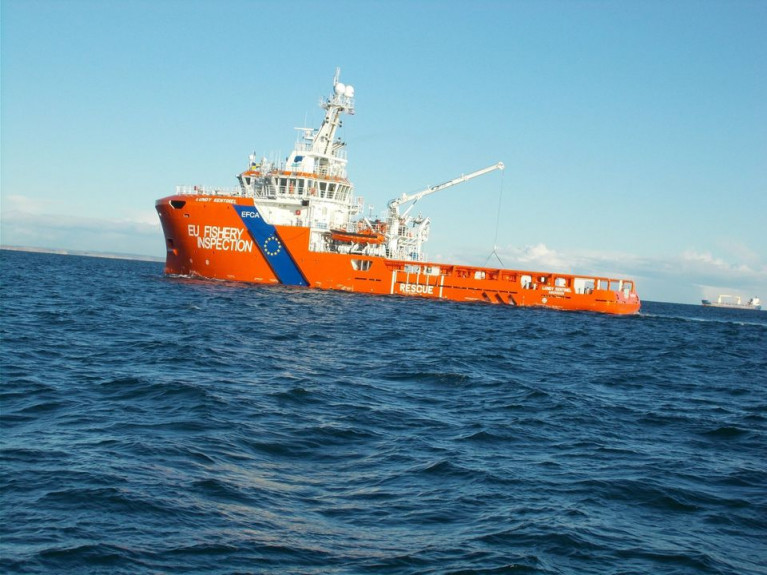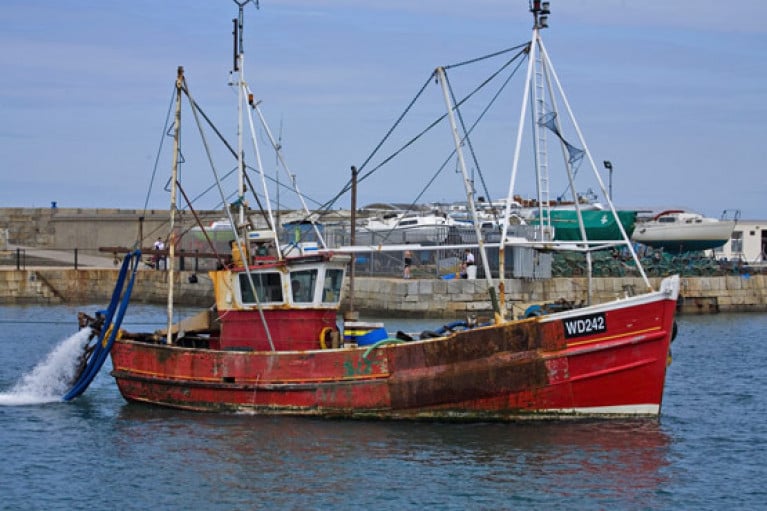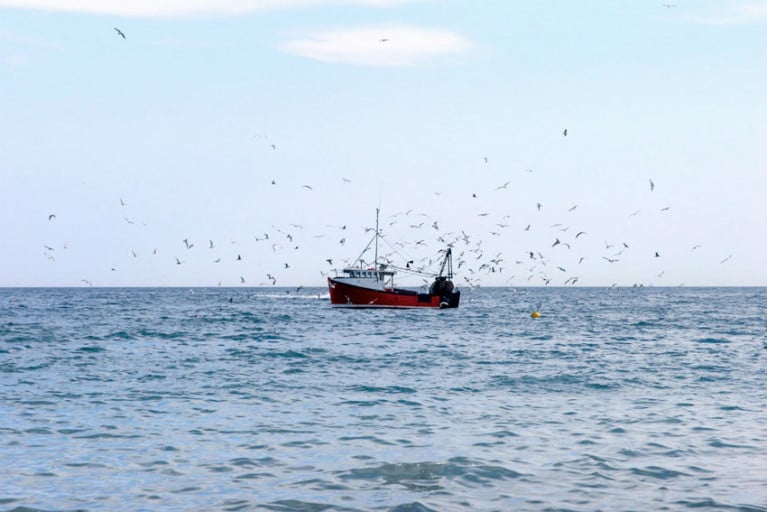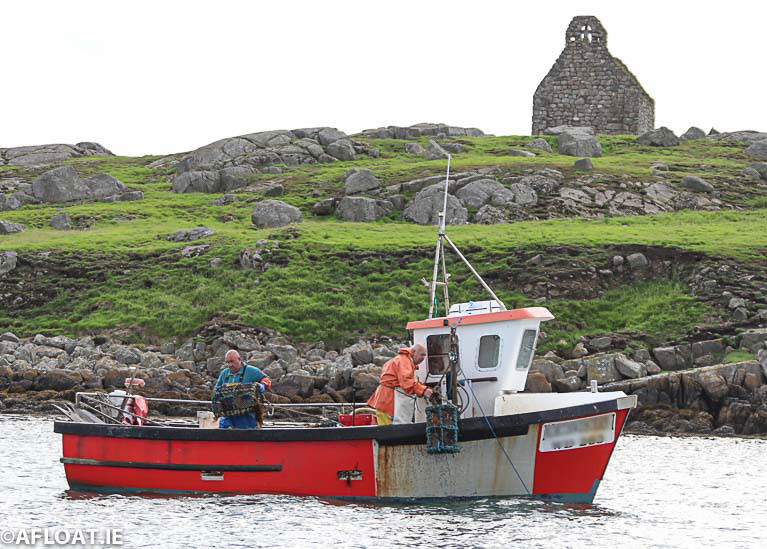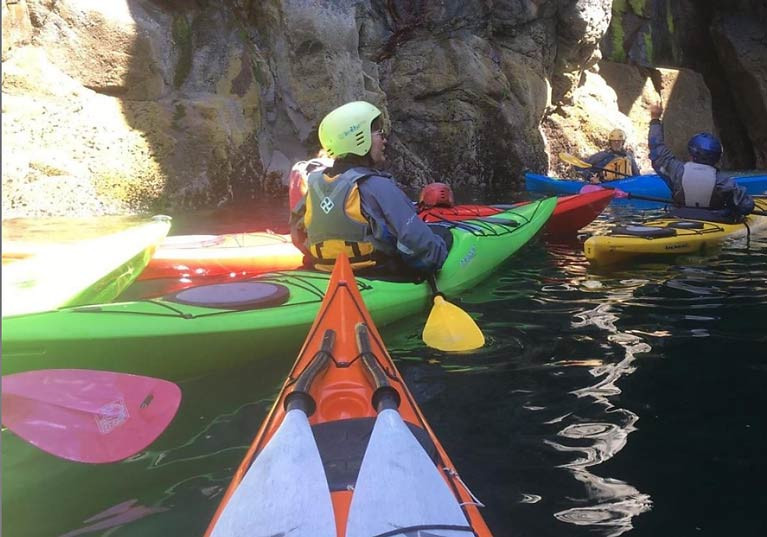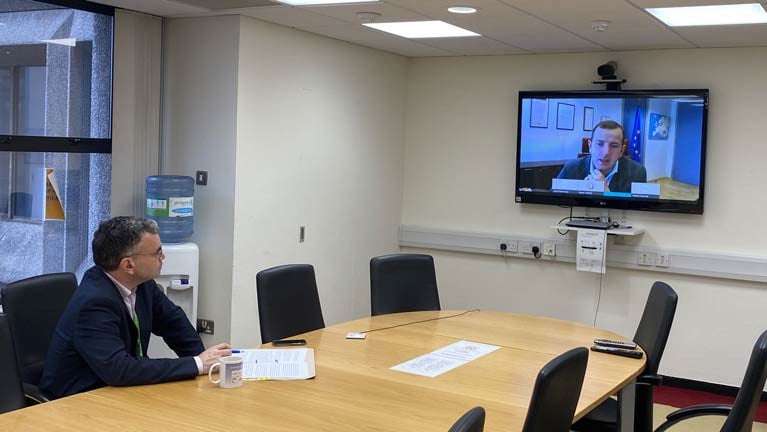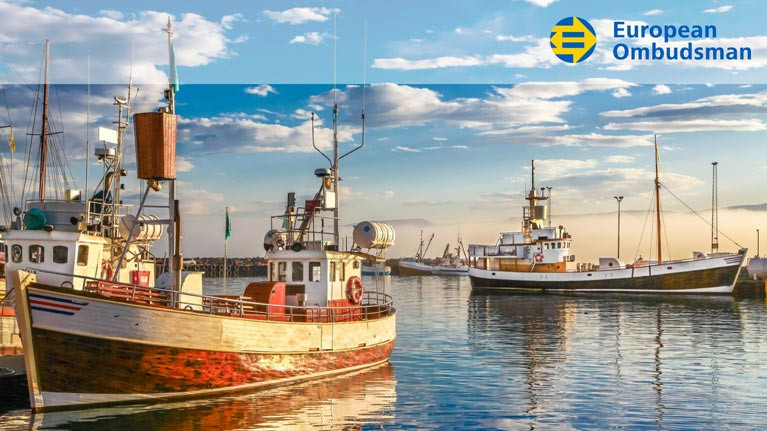Displaying items by tag: fisheries
EU Commission Adopts €258 million European Maritime, Fisheries and Aquaculture Fund (EMFAF) Programme 2021-27 for Ireland
Minister for Agriculture, Food and the Marine Charlie McConalogue today welcomed the decision by the EU Commission to adopt the European Maritime, Fisheries and Aquaculture Fund (EMFAF) Programme 2021-27 for Ireland.
“I am pleased to announce that today the EU Commission has adopted the €258 million EMFAF Seafood Development Programme which envisages significant funding in our seafood sector and our coastal communities. These communities have faced extraordinary challenges in recent times, particularly due to Brexit and the Trade and Cooperation Agreement. In 2021, I established the Seafood Task Force to make recommendations to address the challenges arising from these events and I have since announced €225 million in supports utilising the Brexit Adjustment Reserve. This new programme provides for additional, longer term supports to enable our seafood sector to engage in transformational change and for our coastal communities to thrive.”
The EMFAF supports the EU Common Fisheries Policy (CFP), the EU Maritime Policy and the EU agenda for international ocean governance. Building on the European Maritime and Fisheries Fund (EMFF) 2014-2020, it provides supports to achieve food security through the supply of seafood products, growth of a sustainable blue economy and healthy, safe and sustainably managed seas and oceans.
Minister McConalogue in the preparations for the new EMFAF Seafood Development Programme, which runs up to 2027, has secured an increase in overall funding over the previous EMFF programme. The new EMFAF Seafood Development Programme envisages funding up to €258.4 million, which includes a €134 million EU contribution and a Government of Ireland contribution of €116 million.
The EMFAF Programme aims to support a diverse range of activities within the marine area. For fisheries, the Programme will support capital investment on board, capital investment ashore relating to the landing obligation, innovation in fishing gear and methods, technical advice to the fleet, acquisition of first vessel by young fishers, supports to the inshore fleet, training and marketing.
For aquaculture, the Programme will support implementation of the National Strategic Plan for Aquaculture. This will include in particular support for capital investment in aquaculture sites, supports for innovation and research to develop technology and enhance knowledge, advisory services, training and marketing.
For processing, the Programme will support capital investment in seafood processing enterprises, in particular to add value to raw material, enhance energy efficiency, reduce CO2 emissions, and enhance competitiveness. It will also support innovation to develop new products, advisory services, marketing and training.
The Programme will support the socio-economic development and diversification of coastal communities through the seven Fisheries Local Action Groups. This will carry on from the Brexit Blue Economy Enterprise Development Scheme, implemented through the FLAGs over 2022/23, but will also have a broader remit to support community type projects.
The Programme will support Ireland's environmental obligations through a continuation of the EMFF Marine Biodiversity Scheme. This will fund appropriate assessment of fisheries and aquaculture activities, reporting on the Marine Strategy framework Directive, projects in support of the CFP, and species and habitat restoration.
The Programme will support enhancement of Ireland's knowledge of its marine environment, particularly in terms of enhancing knowledge of climate change impacts on fish stocks, habitats and species.
Lastly, the Programme will fund Ireland's compliance with its obligations under the CFP, specifically for fisheries protection and for fisheries management science. Minister McConalogue added:
“The programme has been developed in cooperation with a wide range of stakeholders to ensure we can help our seafood sector and coastal communities to maximise their potential while protecting our marine environment and its rich biodiversity.”
The European Maritime and Fisheries Fund (EMFF) 2014-2020 was established by EU regulation (508/2014). Ireland’s EMFF Programme was adopted in 2015 and was co-funded by the European Union and Government of Ireland. Through this joint funding €240 million was allocated to the programme.
Brussels Approved New Fisheries Control Plan for Ireland
The European Commission has approved a new fisheries control plan for Ireland, according to the State’s regulator.
The Sea-Fisheries Protection Authority (SFPA) says that the new control plan will allow Ireland’s fisheries sector benefit from a derogation which provides an exemption from weighing on landing for 95% of pelagic landings.
The derogation also affects a proportion of demersal fish landings.
“Should operators wish to avail of the derogation, the new control plan will instead facilitate the weighing of the vast majority of fish after road transport in permitted establishments, unless directed otherwise at landing by an officer of the SFPA,” it says.
“Having now been formally approved by the EU Commission, this new control plan will come into effect on 1st January 2023,” it says.
The existing interim control plan remains in place up to December 31st, 2022, it noted.
The move comes after a draft control plan was submitted to Brussels in September of this year.
The SFPA said it has held “several engagements with industry representatives and operators to ensure that they are provided with details of the requirements of the new control plan”.
Potential Duplication of Effort with New Common Fisheries Policy Review Group Highlighted by Fisheries Expert
Fisheries expert Dr Kevin Flannery has expressed concern at a potential duplication of effort in the decision to set up a new group to prepare for the EU Common Fisheries Policy (CFP) review.
“Much work was accomplished by the recent seafood task force, and that group worked very well together and was very well informed,” Flannery, who was a member of the task force, noted.
“It would have saved a lot of time and effort if that grouping had been kept together by Minister for Marine Charlie McConalogue,” he said.
The new CFP review group was announced on February 9th by Mr McConalogue. It is to be chaired by John Malone, former secretary-general of the Department of Agriculture.
 Fisheries expert Dr Kevin Flannery
Fisheries expert Dr Kevin Flannery
He will be assisted by a steering committee comprising Mr Micheál Ó Cinnéide, former director of the Marine Institute and Environmental Protection Agency, and Mr Donal Maguire, former Bord Iascaigh Mhara director.
The group will involve representatives of stakeholders, including producer organisations, the National Inshore Fisheries Forum, the aquaculture industry, co-ops, and the seafood processing industry. It will also include representatives of environmental NGOs.
Its remit is to examine the issues that arise for Ireland in the context of the CFP Review, to advise the minister on priorities for the negotiations, and to identify strategies most likely to influence the outcome of the review.
Flannery said that much depends on the terms of reference for the EU CFP review, and initial council meetings suggested that it would take a conservative approach.
During a visit to Ireland in late September 2021, EU Commissioner for Fisheries Virginijus Sinkevičius said he “cannot promise” any fundamental change.
“We’ll do a review, and we will be listening to stakeholders’ concerns, and we’ll look at certain changes, but I cannot promise we will be reopening the CFP,” the commissioner said.
“Fishermen have to go through a lot to comply with the rules, and I think it would be unfair to make many changes, so I take a very cautious way here, and only after a review is done and gaps are identified can we take additional action,” the commissioner added.
The current dire condition of the Naval Service led Ireland to rely on a European Union (EU) ship to help patrol its fishing zone for the first time this year.
According to the Irish Times, the Irish Sea-Fisheries Protection Authority (SFCA) requested and received the support of the European Fisheries Control Agency (EFCA) in patrolling Irish waters on four occasions between January and March in 2021.
This was considered necessary because “the Naval Service could not commit to increase its patrol days at sea under a joint-EU initiative co-ordinated at EU level by EFCA.”
It was the first time Ireland had to rely on the EFCA’s vessel (Afloat can reveal as the Lundy Sentinel).
The revelation was contained in a blunt assessment from the Department of Agriculture, Food and Marine to the Commission on the Defence Forces which is examining the future role and capabilities of the Irish military.
Fishery protection is the core role of the Naval Service, which has been hit particularly hard by the manpower crisis impacting the entire Defence Forces.
Last year there was a 25 per cent decrease in the number of fishery patrols carried out by the Naval Service compared to 2019.
For more on this notable first fishery patrol duty performed by the EFCA in Irish waters, click here.
Review Shows Irish Fishing Industry Buoyed By Exports But Brexit & COVID-19 Cast A Shadow
The Department of Agriculture, Food and the Marine’s latest Annual Review and Outlook for the fisheries sector is a generally positive one — though tempered by the challenges of Brexit and the coronavirus.
Published today, Thursday 8 October, the review cites CSO figures for 2019 which put the value of Irish seafood exports at €577 million with increases in the value of both salmon and mackerel, Ireland’s most valuable export catches.
Mackerel’s 7% value increase was particularly remarkable as it came despite an 8% drop in volume, following a reduction of the quota by one fifth — thanks in part to a bullish market in Asia.
Shellfish exports had a challenging year in 2019, however, with volumes and values down significantly in the oyster sector.
The coronavirus pandemic has seen similar challenges experienced across the fisheries and aquaculture sectors over the course of 2020 thus far.
“Nonetheless, in spite of the difficulties, the fishing industry has continued to keep food in our shops and on our tables during this extraordinary time,” the report says.
“This has highlighted the vital role that the fishing industry plays in the food chain. This, in turn, underscores the importance of ensuring the sustainability of our fish stocks.
“Due to the closure of the food service sector around the world during the pandemic and transportation issues, exports of fish from Ireland were down around 20% in value during the first four months of 2020.”
Meanwhile, Brexit remains a serious concern, with fears that more than 70% of the Irish fishing fleet could lose access to their regular grounds in UK waters in the absence of a deal on fisheries.
The report outlines: “The UK demand is that quota shares are established on the basis of ‘zonal attachment’ and each year access to the UK fishing grounds are ‘purchased’ using the transfer of EU quota to the UK as recompense for this access.
“If the UK zonal attachment demand was applied, it would have huge negative consequences on Irish fisheries because the UK could claim a much higher proportion of the available fishing quotas for each stock each year.”
It continues: “The UK ‘zonal attachment’ claim is based on the level of catches taken from UK waters. If this criterion was used, it would result in Irish fish quotas being cut by 35% in value.
“The displacement of the EU fleet from the Irish exclusive economic zone (EEZ) and/or the reduction in EU quota shares, if remedial measures are not taken, is likely to lead to serious over-exploitation of stocks in our own EEZ; deliver substantial cuts to many of our quotas; [and] cause a substantial control challenge for the Irish navy, and potentially conflict at sea.”
The report also comes on the same day that the High Court struck down the ban on larger vessels fishing within Ireland's six-mile nautical limit, as reported earlier on Afloat.ie, which could have significant conseqences for Ireland's inshore fishing fleet.
The department’s 2020 review and outlook for fisheries and aquaculture can be found attached below, and the full review is available from the DAFM website HERE.
EU’s Warning To Britain Over Withdrawal Agreement As Leaked Cables Show Plan To Keep Fish Stocks For UK Fleet
The European Commission president has warned the British government not to backtrack on its commitments in the Brexit Withdrawal Agreement pertaining to fishing rights, among other issues.
Ursula von der Leyen spoke out on Twitter as a furore has grown over leaked diplomatic cables seen by the Guardian which indicate that the UK intends to hold back on compromise on outstanding issues such as fisheries to provoke a last-minute “trade off”.
As the final round of negotiations gets under way in London today, Tuesday 8 September, Whitehall has also been accused of “introducing” a new “concept” with regards to access for European fishing fleets in British waters — which intersect with Irish waters in a number of key areas.
The UK government position is apparently now that “80% of the common stocks” are designated as “priority stocks” for British fishermen.
The Guardian has much more on the story HERE.
Small-Scale Fisheries & Their Cultural Value - BIM Webinar
Bord Iascaigh Mhara (BIM), Ireland’s Seafood Development Agency, is to host a webinar on Wednesday 9th September 2020 at 2 pm on how the role of cultural values can be integrated more in small-scale fisheries management.
The webinar, which will be chaired and facilitated by BIM and organised by the Cabfishman project, will address the role of cultural values in the management of small-scale fisheries in the Northeast Atlantic and how these values can be more adequately accounted for.
Commenting on the Cabfishman project and webinar, Richard Curtin, Senior Economist with BIM said, “The Cabfishman project is an important international project with partners from Spain, Portugal, France and the UK, addressing common issues facing the small-scale fleets along the Atlantic. A crucial element of the project is the assessment of cultural heritage associated with the sea, fishing and the small-scale fleets and how to value that contribution so it can be accounted for in decision-making and policies and that is something which we are going to explore in this webinar.”
“One of the tasks of the project is to collate examples of cultural heritage and to create an open-access library of these examples that can be added to overtime. From an Irish perspective, we have collated over 400 examples, ranging from artwork by Paul Henry and others, traditional craftsmanship such as currach making, to ancient fishing knowledge such as ‘marcanna na tallamh’.”
This webinar, organised by the Cabfishman project, financed through the INTREREG Atlantic Area Programme, aims to address several questions via the following presentations:
Speakers and topics:
- Evaluating the cultural services of small-scale fisheries in the Atlantic Area – David Castilla (University of Huelva)
- Do small-scale fisheries need yet another research project? From output to outcome through stakeholder involvement – Marta Ballesteros (CETMAR Foundation)
- Do cultural values play a role in Small Scale Fisheries Management? – Norah Parke (Killybegs Fishermen’s Organisation)
The webinar is open to the public to attend and fishers, managers, officials, and those with an interest in the future co-management of small-scale fisheries in Ireland are actively encouraged to attend. To register for the free event visit here
Marine Minister Dara Calleary today announced the award of grants worth €1.2 million to 93 local community groups and micro-enterprises by six of the seven Fisheries Local Action Groups established under Ireland’s European Maritime and Fisheries Fund Programme. The grants are co-funded by the Government of Ireland and the European Union.
Announcing the first tranche of grant awards for 2020, Minister Calleary said, “The FLAG Scheme under my Department’s EMFF Seafood Development Programme is unique in having representatives of our traditional fishing communities make the funding award decisions so that vital local funding gets to the many community development groups and events in our fishing communities, together with important development funding to micro-enterprises involved in fisheries and aquaculture, marine tourism and marine leisure activities. The one thing that unites all these projects is their contribution to the economic and social development of traditional fishing communities, which is what the FLAG scheme is all about.”
Minister Calleary added, “The FLAG Scheme has been operating for just a few years now and with its €12 million allocation under my Department’s EMFF Programme, it has gone from strength to strength. This is testament not just to the demand for such local development funding but very much to the hard work of the local volunteers to make up the boards of each of our seven FLAGs.
FLAG NORTH
|
Applicant |
Project Title |
Support Rate % |
Investment |
Grant |
|
Arranmore Country Fest |
Festival |
80 |
€2,500.00 |
€2,000.00 |
|
Ardara Community Centre |
Upgrade roof at Ardara Community Centre |
80 |
€4,900.00 |
€3,920.00 |
|
Ardara Walking Festival |
Festival |
80 |
€2,500.00 |
€2,000.00 |
|
Greencastle Golf Club |
All Ireland Fisherman Golf Seafood Buffet |
80 |
€2,500.00 |
€2,000.00 |
|
Inishowen Community Media Network (ICMN) |
Croi na Farraige/Heart of the Sea - Digital Media Maritime Heritage Project & TV Documentary |
80 |
€12,250.00 |
€9,800.00 |
|
Inishowen Maritime Heritage Co |
Exhibition space enhancement |
80 |
€5,670.00 |
€4,536.00 |
|
Awake Tourism |
Stage for Heritage Centre |
80 |
€10,251.00 |
€8,200.80 |
|
Hugh Boyle Painter and Decorator |
Equipment |
40 |
€4,800.00 |
€1,920.00 |
|
Forest View Lodges |
Forest View Lodges |
40 |
€16,500.00 |
€6,600.00 |
|
Malin Head Community Association Ltd |
Tourist Map for the Malin Head Area |
80 |
€1,961.85 |
€1,569.48 |
|
Carrigart Development Association |
Carrigart Development Association Environmental & Tourism Project |
80 |
€2,089.77 |
€1,671.82 |
|
Scoil Mhuire Buncrana |
Scoil Mhuire Sailing Centre |
80 |
€10,416.24 |
€8,332.99 |
|
Malin Head Fishermans Co-operative Society |
Equipment Roller Doors |
60 |
€8,142.00 |
€4,885.20 |
|
Inver Community Centre Company Limited by Guarantee |
Inver Community Centre - Enhancing an Existing Community Asset |
80 |
€4,995.64 |
€3,996.51 |
|
Comharchumann forbartha Ghaoth Dobhair |
Athnuachan ar chóras séarachais ag an Chrannóg |
80 |
€11,200.00 |
€8,960.00 |
|
Comharchumann na nOileán Beag |
Féile Ghabhla / Gola Island Festival 2020 |
80 |
€2,500.00 |
€2,000.00 |
|
Comharchumann Oileán Árainn Mhór CTR |
Tourist Information Booklet |
80 |
€1,992.00 |
€1,593.60 |
|
Kilcar Kayaks |
Equipment and Training |
80 |
€19,122.00 |
€15,297.60 |
|
Coiste Halla Paróiste |
Energy Renewal Programme |
80 |
€2,814.00 |
€2,251.20 |
|
Forbairt Dhún Lúiche |
Ionad Pobail Dhún Lúiche & Féile an Earagail |
80 |
€4,892.93 |
€3,914.34 |
|
Forbairt Dhún Lúiche |
Féile an Earagail |
80 |
€2,500.00 |
€2,000.00 |
|
Glenties Cardiac First Responders |
Purchase of Training/Life Saving Equipment |
80 |
€18,719.61 |
€14,975.68 |
|
Donegal Dragons |
Donegal Dragons Safety Boat |
80 |
€16,500.00 |
€13,200.00 |
|
Cumann Staire agus Seanchais na nOileán |
Gola Picnic Area |
80 |
€2,300.01 |
€1,840.00 |
|
JK Engineering |
Environmentally Efficient Generator and Plasma |
50 |
€12,960.00 |
€6,480.00 |
|
Oidhreacht Thoraí (Tory Island Festival of Football Organising Committee) |
Féile Peile Oileán Thoraí / Tory Island Football Festival |
80 |
€2,500.00 |
€2,000.00 |
|
Donegal Women in Business Network |
Core business skills for women in business |
80 |
€2,500.00 |
€2,000.00 |
|
Foresters Community Hall Ltd CLG |
Installation of a Kitchen |
80 |
€21,460.00 |
€17,168.00 |
|
Gola Island Outdoor Education |
Safety Boat Outboard Engine |
50 |
€10,440.00 |
€5,220.00 |
|
Comharchumann forbartha Ghaoth Dobhair |
Plean Gnó do Thogra Turasóireachta ag Teach Mhuiris, Cnoc Fola |
80 |
€18,000.00 |
€14,400.00 |
|
18th Donegal Moville Port Sea Scouts |
RYA Level 1 & 2 Power Boat, RYA Foundation Safety Rescue Training, RYA Sail T |
80 |
€4,800.00 |
€3,840.00 |
|
Áislann Chill Chartha |
Riverside Cáfe, The Áislann |
80 |
€12,756.00 |
€10,204.80 |
|
Uachtar Reoite Bunglas |
Uachtar Reoite Bunglas |
40 |
€22,497.00 |
€8,998.80 |
|
Comharchumann Thoraí Teo |
Féile Soilse Thoraí 2020 |
80 |
€2,500.00 |
€2,000.00 |
|
Comharchumann Thoraí Teo |
Oíche Fhéile Eoin - Tory Island Seafood Festival 2020 |
80 |
€2,500.00 |
€2,000.00 |
|
Teach Bhillie |
Féile Ceoil Ghort a Choirce |
80 |
€2,500.00 |
€2,000.00 |
Total |
€287,430.05 |
€203,776.82 |
FLAG WEST
|
Applicant |
Project Title |
Rate |
Total Cost |
Grant Aid |
|
Blue Water Fishing |
Replacement Engines for Angling Vessel Blue Water |
50 |
€92,288.00 |
€46,144.00 |
|
Cruzco Adventure Limited trading as West Coast Aqua Park |
West Coast Adventures |
FLAG SOUTH
|
Applicant |
Project Title |
Rate |
Total Cost |
Grant Aid |
|
Dursey Ferry Ltd |
Boat Trips & Tour |
50 |
€36,334.00 |
€18,167.00 |
|
Kieran O'Sullivan Bait Store |
Bait Store & Refrigeration |
50 |
€3,462.00 |
€1,731.00 |
|
Ballycotton Harbour (Port Authority: Cork County Council) |
Provision of insulation fish boxes for local fishermen |
100 |
€4,950.00 |
€4,950.00 |
|
Ger Coughlan Fisherman |
Online operation |
40 |
€657.00 |
€262.80 |
|
Fish Seafood Deli Ltd t/a The Fresh Fish Deli |
Business Expansion |
50 |
€94,497.29 |
€47,248.65 |
|
Bantry Bay Boat Hire Limited |
Bantry Bay Boat Hire Limited |
50 |
€991.00 |
€991.00 |
|
The Lobsters Tale |
The Lobsters Tale |
50 |
€10,166.15 |
€5,083.08 |
|
Ballycotton Seafood |
Retail Store Fit-Out & Development of Artisan Seafood Products |
50 |
€122,156.00 |
€61,078.00 |
|
Myross Rowing Club |
Safety Boat and Boat Storage Shed |
80 |
€40,204.19 |
€32,163.36 |
|
Owen Martin O'Sullivan |
West Coast Fish and Chips |
50 |
€45,995.00 |
€22,997.50 |
|
Le Jusant Ltd |
Freezer Room for storage of frozen at sea prawns ashore |
50 |
€11,585.00 |
€5,792.50 |
|
Total |
€370,997.63 |
€200,464.89 |
FLAG SOUTH EAST
|
Applicant |
Project Title |
Rate |
Total Cost |
Grant Aid |
|
The Waterford Motor Boat & Yacht Club |
The up grading of the toilet facilities for marina users |
80 |
€20,460.09 |
€16,368.07 |
|
Wicklow County Council |
Angling Survey of Wreck Fishing East Coast of Ireland |
70 |
€9,000.00 |
€6,300.00 |
|
Blue Mind Dunmore - SUP and Yoga |
Blue Mind Dunmore - SUP & Yoga |
50 |
€16,205.59 |
€8,102.80 |
|
Sigginstown Castle |
Sigginstown Castle Renovation |
40 |
€115,734.00 |
€46,293.60 |
|
Helen Mason Art |
Helen Mason Art Website, Social Media Management & Exhibition |
50 |
€7,792.50 |
€3,896.25 |
|
Bunmahon Surf School |
New premises for Bunmahon Surf School |
50 |
€17,342.80 |
€8,671.40 |
|
The Jolly Roger Smokehouse |
The Jolly Roger Smokehouse |
50 |
€13,104.76 |
€6,552.38 |
|
Ealga C. Fishing Ltd |
Upgrade Business and Equipment |
50 |
€157,389.00 |
€78,694.50 |
|
Hook Rural Tourism |
Marine Tourism Promotional Boat Trips |
80 |
€4,725.00 |
€3,780.00 |
|
Hook Rural Tourism Ltd |
Hook Rural Tourism Brand Activation |
80 |
€15,660.00 |
€12,528.00 |
|
The Irish Experience |
The Irish Experience Tour Expansion Plan |
50 |
€18,422.90 |
€9,211.45 |
|
Total |
€395,836.64 |
€200,398.45 |
FLAG SOUTH WEST
|
Applicant |
Project Title |
Rate |
Total Cost |
Grant Aid |
|
John Fitzgerald |
Seaweed Knife & spoon handle project |
50 |
€1,789.00 |
€894.50 |
|
Mara Beo Teo Dingleworld Aquarium |
Marine Educational Outreach programme |
50 |
€20,047.00 |
€10,023.50 |
|
The Boathouse Cromane |
Promotion and Equipment |
50 |
€10,564.49 |
€5,282.25 |
|
Dingle Sea Salt Co. / Salann Mara an Daingin |
Adding value to fisheries and aquaculture-related products |
50 |
€21,947.76 |
€10,973.88 |
|
Tralee Rowing Club (Cumann Ramhaíochta Thrá Lí) |
Tralee Rowing Club |
50 |
€10,000.00 |
€5,000.00 |
|
Skellig Michael Cruises Ltd |
Eco Wild Life boat Tours to see Puffin Island, Kerry Cliffs and Trans Atlantic cable |
30 |
€65,000.00 |
€19,500.00 |
|
Dingle Oceanworld Aquarium |
Interactive and virtual ocean education |
50 |
€13,444.00 |
€6,722.00 |
|
The Star Marina Ltd t/a Star Outdoors |
Safety boat and aqua park |
35 |
€25,220.00 |
€9,037.50 |
|
Tehan Partners |
Teleporter Purchase to support a mixed fishery operation |
40 |
€61,500.00 |
€24,600.00 |
|
Coiste Forbartha na Sceilge CLG |
Reen Pier Development |
80 |
€60,000.00 |
€48,000.00 |
|
Kenmare Tidy Towns |
ECOTELLY – Virtual Aquarium, Kenmare Bay Marine Life - Public Art |
80 |
€7,796.63 |
€6,237.30 |
|
Callinafercy Rowing Club |
Seine Boat Restoration |
50 |
€9,792.00 |
€4,896.00 |
|
Maharees Conservation Association CLG |
A Placename (Logainm) Study of Maharees |
80 |
€8,235.00 |
€6,588.00 |
|
Irish Elasmobranch Group |
Irish Sharks and Rays booklet |
80 |
€840.00 |
€672.00 |
|
Total |
€316,175.88 |
€158,426.93 |
|
Grand Total |
€2,317,592.18
|
€1,230,040.13
|
Marine Minister Calleary & EU Fisheries Commissioner Sinkevičius Discuss Challenges Facing Sector
The Minister for Agriculture, Food and the Marine, Dara Calleary T.D, held discussions, by video link, with EU Fisheries Commissioner Virginius Sinkevičius on Ireland’s fisheries priorities. The Minister focused on the issues for fisheries in the ongoing EU negotiations with the UK on a possible future fisheries agreement.
Minister Calleary explained the serious concerns Ireland has with the possible implications arising from the UK departure from the EU and its potential impact on the Irish Fishing Industry.
Minister Calleary said “I explained to Commissioner Sinkevičius that I had met representatives of Ireland’s fishing sector yesterday and heard at first hand the substantial impacts if there were significant changes to the current quota shares and access to waters arising from the EU/UK negotiations. I made clear to the Commissioner that we are placing our full reliance on Mr Barnier and the Commissioner delivering on the agreed EU negotiation mandate that sets down clearly the EU objective to “uphold existing reciprocal access conditions, quota shares and traditional activity of the Union fleet”.
The Minister emphasized the absolute necessity that fisheries not be negotiated in isolation from the other elements of the Future Relationship. Minister Calleary said “I appreciate that we are facing very challenging negotiations on fisheries. I made clear that we are seeking that the EU leverage the wider EU/ UK Future relationship to secure the interests of the Irish and EU fishing sector. I assured Commissioner Sinkevičius of my full commitment and co-operation in working to deliver a fisheries agreement that protects the interests of the Irish fishing sector now and into the future.”
The discussion also covered other fisheries priorities including the EU funding package for the seafood sector, including COVID related supports; the negotiations on a new EU Control framework and control challenges facing Ireland, which were raised by the Commissioner; and finally the very strong commitment to progressing further our joint EU commitment to sustainable fisheries.
EU Ombudsman Emily O’Reilly has expressed “regret” that EU fisheries ministers failed to adopt her office’s demand for more transparency in dealing out annual catches and quotas in EU waters.
Ms O’Reilly’s comments follow the EU Council’s refusal to accept a recommendation by her office for greater transparency in the lead up to the annual catch and quota negotiations under the Common Fisheries Policy (CFP).
Ms O’Reilly has confirmed her finding of “maladministration” against the EU Council and has expressed disappointment that the council had failed to respond positively.
“It suggests the Council has failed fully to grasp the critical link between democracy and the transparency of decision-making regarding matters that have a significant impact on the wider public,” Ms O’Reilly said.
“ This is all the more important when the decision-making relates to the protection of the environment,” she said.
“The Council’s position appears to be that a key democratic standard - legislative transparency - must be sacrificed for what it considers to be the greater good of achieving a consensus on a political issue,” she said.
We regret that @EUCouncil has not followed our recommendation to improve #transparency of how Fisheries Ministers decide on annual fishing quotas.
— European Ombudsman (@EUombudsman) May 4, 2020
The inquiry was based on a complaint, which argued that publishing key documents is in the public interest.https://t.co/3nRneUKEky pic.twitter.com/nEN6rVNThk
Late last year, the EU Ombudsman’s office said that the EU Council should “proactively” release documents on annual fishing quota negotiations into the public domain.
The documents should be made public at the same time as they are circulated to member states, or “as soon as possible thereafter” to “promote greater transparency of environmental information”, it noted.
The recommendation followed a complaint by non-profit environmental law organisation ClientEarth, which has offices in London, Brussels, Warsaw, Berlin and Beijing.
The EU Ombudsman investigation was opened last May after the lawyers’ organisation raised the issue of “many years of unexplained fishing quotas, set above the scientific advice for the recovery and long-term sustainability of fish populations”.
The finding in favour of the complainant took the view that since the documents in question are “legislative documents” and contain environmental information , “wider and more timely access should be granted”.
The investigation also considered the documents to “contain environmental information within the meaning of the Aarhus Regulation” on access to information, public participation and access to justice in environmental matters.
It noted that complainant ClientEarth was concerned that not only did the EU’s fisheries council fail to “provide timely access to legislative documents”, but also “has in place an incomplete and unsatisfactory register of documents”.
In its defence, the EU Council argued that proactively releasing documentation could “seriously undermine” decision-making by ministers at the annual December negotiations.
It argued that it could “delay the successful outcome of Council deliberations, as member states need to balance different interests at stake for more than a hundred fish stocks in preparing their initial positions”.
It said that it could expose the Council to “external pressure” as “the context in which the negotiations take place is highly politicised and subject to external attention”.
It said it would also “require a comprehensive case-by-case assessment of the individual information ....to verify whether or not exceptions laid down in the EU rules on access to documents prevent such a disclosure” and would require consultation with “relevant participants”.
ClientEarth environmental democracy lawyer Anne Friel welcomed the EU Ombudsman ‘s “stance against the Council’s lack of transparency”.
“But we regret that despite taking crucial decisions for the future of our planet, the Council of the EU still refuses to open its decision-making to public scrutiny, dubiously claiming that it would delay or influence the process,” Ms Friel said.
“Every year, some member states push for fishing catch limits above scientific advice, undermining the sustainability of our ocean and fisheries sector without being held accountable. As a result, the EU has failed to meet the 2020 deadline to end overfishing,” she noted.


























